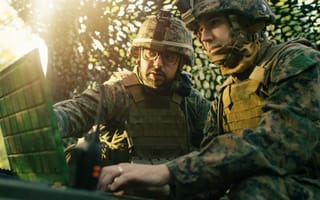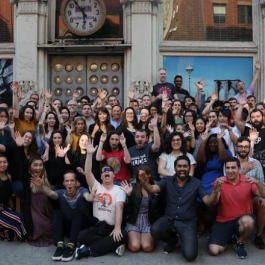Transitioning from active duty into civilian life can be a time of uncertainty for people enlisted in a military branch. After all, a majority of service members spend years — if not decades — immersed in a familiar environment with a structure that everyday life outside of the armed forces does not follow. Still, the U.S. Department of Labor estimates that approximately 200,000 men and women make the transition into civilian livelihood every year.
So when the time for an honorable discharge arrives, where do the veterans go?
For many, it breaks down to skill sets. The military is no stranger to working with innovative technology — they’ve established contractual partnerships with some of the biggest names in the industry, including Google, Amazon and Microsoft. Military leaders are also well-versed in guiding teams through high-stress scenarios and embracing advanced technology to accomplish high-stakes missions.
And while building a ship or putting out massive structural fires might not be the same as using machine learning to analyze abnormal financial transactions, many of the skills learned during a military career directly translate into the opportunity to thrive in tech.
For Army Reserve veteran Julie Payton, one of the most beneficial insights learned throughout her service was being able to recognize the slow sum of many parts coming together in order to reach larger goals. This has also helped her deliberately seek out work and a work culture that keeps her motivated as a business strategy analyst at Animoto.
“The Army is a daily lesson in patience and finding the intrinsic motivation to show up every day regardless of what is on the agenda,” Payton said. “Just like everyone wants to believe the military is all valor and heroism, people want to believe the tech industry is all fast-paced innovation.”
In honor of Veteran’s Day, Built In NYC caught up with experienced New York veterans like Payton and Capital One’s Eric Mireles to discover how many of the skills acquired throughout their military careers translate seamlessly to a role in the tech industry, and why there’s still so much to learn in a life after service.
For Army Reserve veteran Julie Payton, enlisting in the military was an opportunity to be a part of its ranks in a cohesive unit. But when it comes to transitioning that experience into a successful tech career, some valuable lessons became clear: Don’t be afraid to stand out, push back and establish your value.
How and where did you serve your country? What is your current role, and what are you working on right now?
I have been a firefighter in the U.S. Army Reserves for the last five years and have deployed to Iraq and Syria under Operation Inherent Resolve. I am currently chief of staff at Animoto, an online DIY video creation service.
What aspects of your military service have helped you build a career in tech, and what are some new skills you’ve developed since you left the service?
The most impactful lessons from the Army that I leverage on a weekly basis are the sum of many small moments. The Army is a daily lesson in patience and finding the intrinsic motivation to show up every day regardless of what is on the agenda. Just like everyone wants to believe the military is all valor and heroism, people want to believe the tech industry is all fast-paced innovation. In reality, both worlds have many daily tasks that are less glorified or openly discussed. Setting realistic expectations is the key to remaining grounded and achieving incremental goals.
Since joining the service, I have learned the art of constructively pushing back on leadership. In basic training, acceptable responses when asked a question are “Yes or no, drill sergeant,” not “I understand where you are coming from, drill sergeant, but let me offer a different perspective.” While the respect for higher ranks translates well, pushing back on senior leadership civilian-side is not a privilege; rather, a requirement for success. Blind agreement is the enemy of critical thinking and being able to effectively communicate concerns is a trait that separates task executors from thought leaders.
You have spent a portion of your life serving your country — be selfish with where you choose to work.”
What advice would you give to fellow veterans who are looking to build a career in the tech sector?
First, celebrate your accomplishments and build your brand. The military teaches you how to be part of its ranks, but in the civilian world, you need to find ways to stand out. Understanding your unique value proposition and being able to confidently convey it could mean the difference between selecting you and another candidate. Avoid selling yourself short with nondescript labels such as “operational leader.” Introspect, find what makes you different, and do not hesitate to make it known. It is not boastful — interviews are a two-way street and companies will be lucky to have you.
Second, be deliberate about finding the work culture that will truly motivate you. The tech industry is often labeled as laid back, but in reality, work cultures run the gamut. There are tech environments that are a grind, environments that are very slow and environments that fall somewhere in the middle. No one will be able to tell you the environment that you will thrive in the most. You have spent a portion of your life serving your country — be selfish with where you choose to work. Finding the right culture fit will naturally elevate you to be the best civilian employee you can be.

Attention to detail, project management knowledge, communication and collaboration skills: These are all important qualities to possess in order to thrive in any tech role. They’re also the skill sets Navy veteran Eric Mireles acquired while building ships during his military career. His advice for anyone looking to break into the tech scene after military service? “Go for it!”
How and where did you serve your country? What is your current role, and what are you working on right now?
I was a Navy logistics specialist, project manager and shipbuilder serving in the Atlantic, European and Middle East theaters.
Currently, I am the primary agile delivery lead and release train engineer responsible for all delivery efforts for a machine learning and a data science team within our tech automation and optimization organization.
Shortly after joining Capital One, I assisted in the creation of two teams that were responsible for building out a brand new and very unique product for the enterprise. This new product utilizes machine learning to track down anomalous activity and abnormal transactions within Capital One’s vast enterprise architecture. This product was the first of its kind and helps development and site reliability engineering teams to reduce and resolve customer-facing outages that can impact our overall customer experience and Capital One’s reputation.
What aspects of your military service have helped you build a career in tech, and what are some new skills you’ve developed since you left the service?
As for military service skills: attention to detail and prioritization. During my time as a senior logistician and Navy shipbuilder, I was assigned to lead many high-profile projects that required me to keep detailed timelines and remain focused on maintaining key relationships in order to get the job done. When building out our software and data science teams, I relied heavily on these skills to ensure the team met critical deadlines and scaled appropriately. Not only was I required to prioritize my own tasks, but also to prioritize joint deliverables across the teams.
Communication and collaboration were also important. Much like in the military, everyone at Capital One comes together to meet a common goal. As an agile delivery lead and facilitator, it is my responsibility to ensure key players and executors are working together. The communication skills I learned in the Navy help me to ensure all players are on the same page and understand their responsibilities in getting us to our end goal. I love this aspect of my company culture and my newly acquired mission after my time in uniform.
As for any new skills gained after the service, being humble and willing to admit when you need to ask for help has been key. Admitting you need help in the service was not a widely accepted trait during my time in uniform. At Capital One, I have learned many new things within my two years by simply reaching out and asking for help. Capital One’s culture of learning and support is unmatched. By admitting I need assistance and additional training, I’ve been able to better contribute to my team and achieve some really great milestones with our product.
These jobs give military leaders and project managers like myself a brand new audience and another mission worth standing behind.”
What advice would you give to fellow veterans who are looking to build a career in the tech sector?
Go for it! It’s never too late to get into a new field that is high in demand. Tech has not just been a growing field within our company, but it has also made its way into every major industry out there. Nowadays, every company has some sort of tech component, allowing companies to create an advantage over their competitors.
When I left the service, I was very intrigued by the idea of working in a growing field and completely changing course from my original military career. When a career in tech caught my attention, I quickly discovered that tech companies need project managers and facilitators to lead their software development teams and deliver cutting-edge products. In turn, these jobs give military leaders and project managers like myself a brand new audience and another mission worth standing behind.
I am extremely proud of my time in uniform, as well as my contributions to building products that help our customers and tech as a whole. I am continually amazed by the accomplishments of my teams and I am continually marveled by the forward-thinking mentality of Capital One. The entire company is really great at rallying together to deliver the best and brightest products to our customers. It’s easy to see that at Capital One, our customers are always the driving force behind everything we do.
I am glad to call Capital One my employer and look forward to seeing what cutting-edge campaign we will launch next.









